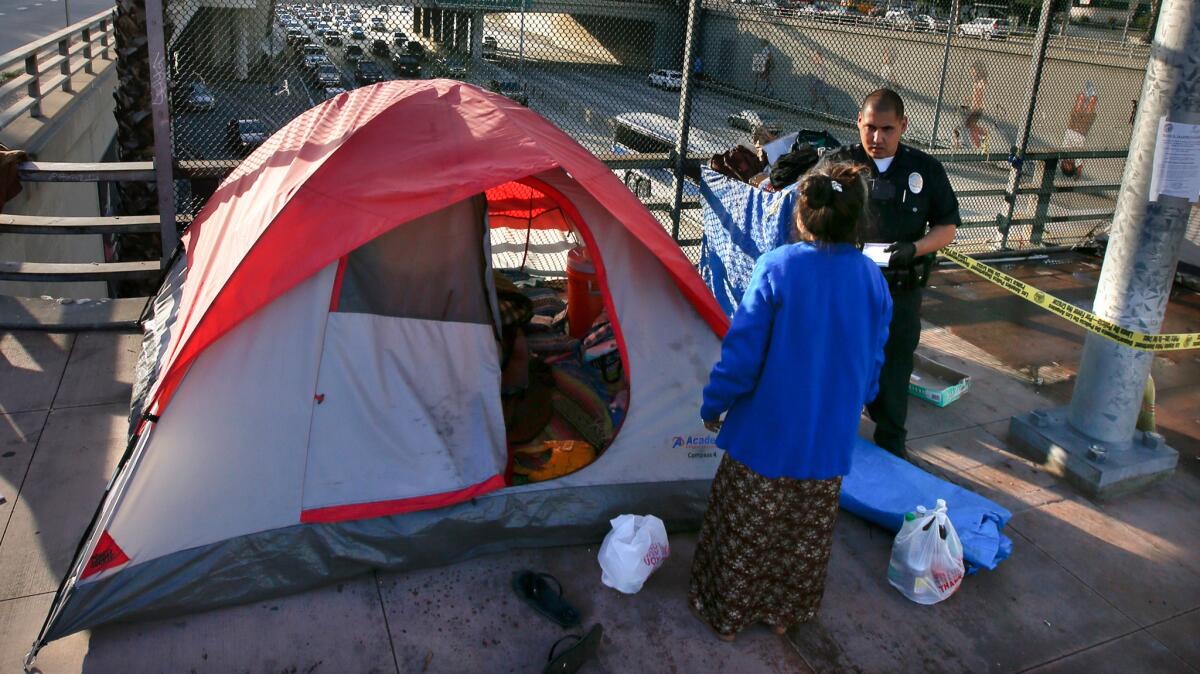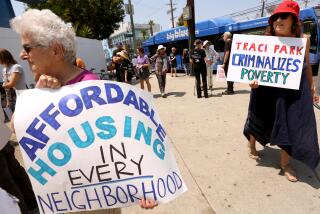L.A. voided millions of old tickets and warrants. Here’s why it won’t help homeless people

- Share via
When Los Angeles officials decided to toss out millions of citations and warrants in early October, they hailed it as a boon for homeless people. The purge, they said, would “unclog” the court system and stop the cycle of debt and arrests that has made it harder for the poorest Angelenos to land jobs and housing.
But weeks after the announcement by L.A. City Atty. Mike Feuer, L.A. County Dist. Atty. Jackie Lacey and LAPD Chief Michel Moore, it has become clear that their amnesty program is unlikely to lead to a total end to criminal consequences for low-level offenses by people who live outdoors.
Moore said his department has no plans to quit writing citations for minor “quality of life” violations, such as leaving a tent in a public space during the day. And the decision does not cover citations and warrants issued in the past five years — a period in which homelessness exploded by 34%, stranding 59,000 county residents in cars, shelters and encampments, including 36,000 who live in the city.
Judges with Los Angeles County Superior Court also will continue to issue bench warrants and $300 “civil assessments” for homeless people who don’t pay citations or show up in court, a spokeswoman said.
Warrants for scofflaws helped drive the LAPD’s homeless arrests up 31% from 2011 to 2016, a Times data analysis found, and paying for tickets or appearing in court remains out of reach for most homeless people. The LAPD reported that 90% of homeless people cited in the last quarter of 2017 were no-shows.
“People who are trying just to survive, without either housing or transportation, are rarely able to appear on citations,” said retired UCLA law professor Gary Blasi, who studies homelessness. “That means every citation given to a homeless person is likely to eventually result in an arrest.... Even one night in jail often results in a person losing everything they own and any place they had in temporary housing.”
In 2016, The Times found that Los Angeles police generally enforce more than a dozen “quality of life” laws, such as restrictions on sleeping on public property, living in a car or low-level drug possession, with a citation. The tickets typically start out at less than $100, but often top $300 once court fees are added. Tickets pile up, and people go to jail.
On Sunday, Jeanne Barker lined up outside a citation clinic run by volunteer civil rights attorneys. She was seeking help with a ticket that she had received that morning because her tent was left up on a Venice sidewalk at 9 a.m. — past the city’s 6 a.m. deadline for packing up encampments.
“We’re on the list for emergency bridge housing,” said Barker, a former Mar Vista resident who has been homeless for three months, since her nephew asked her to leave over her drug addiction. “I’m trying to get my stuff rebuilt, but it’s not easy.”
Moore had called for the purge a year ago, saying that warrants and citations for minor infractions were overwhelming the courts, jails and police stations. Some people had 10 citations in the system, including a number that were 5 or 10 years old.
“They are clogging up the system,” he told The Times.
Lacey declined to be interviewed. But in a statement, she said that her office signed on to the amnesty program when she learned that clearing warrants could expedite access to housing and social services for homeless people.
“The idea of impacting a hard-to-reach population with a program that could help them obtain work and housing by eliminating this obstacle was all I needed to join with the L.A. City Attorney’s Office,” Lacey said.
Feuer said there should be consequences for breaking the law. The enforcement of minor violations, including failing to settle tickets, remains a critical part of the city’s multi-pronged plan to clean up thousands of encampments, and to get homeless people into shelters and housing.
“We need, as a city, to assure that public spaces are safe and accessible for everyone,” he said. “We are trying to strike an important balance here.”
Feuer pointed out that homeless people have new ways to settle citations without going to jail. In response to a 2016 civil rights lawsuit, Los Angeles Superior Court posted online forms for homeless and poor people to petition for dismissal based on inability to pay. Court spokeswoman Mary Hearn said judges can and do dismiss tickets on homeless people or impose community service instead of fines.
Feuer and Los Angeles County also run the Homeless Court Program to dispose of tickets for homeless people who sign up for housing and social services. The clinics, which the county most recently funded with $1 million from the Measure H tax hike, arranged for the court to dismiss or reduce penalties in more than 1,000 citation and warrant cases in the past two years, and connected more than 1,000 people to homeless case managers.
Gina Di Domenico, the supervising deputy city attorney who helps coordinate and run the clinics, said she has learned firsthand how hard it is for homeless people to shake old tickets.
“These citations for minor pedestrian, vehicle, and qualify-of-life infractions can lead to serious collateral consequences,” Di Domenico said. “Though an individual may have lost their car years ago — those citations stay in the court system until they are addressed by the defendant.”
Peggy Lee Kennedy, a homeless rights activist who helped coordinate Sunday’s legal clinic in Venice, said homeless people are being cited for blocking the sidewalk and smoking on the boardwalk as well as for having their tents up at the wrong time.
“This amnesty is so ridiculous,” she said, “and to make such a big deal out of it is silly.”
A Times analysis found that, in 2016, the LAPD made more than 14,000 arrests of homeless people, up 31% from five years before.
While many U.S. cities are increasingly cracking down on homelessness, San Francisco is moving away from enforcement of minor crimes by people living outdoors. In 2015, judges there stopped issuing bench warrants for unpaid quality-of-life tickets. Then in 2016, the court canceled 66,000 old warrants and citations.
San Francisco Dist. Atty. George Gascon said police need to connect homeless people to services, not criminalize them.
“The reason for that became awfully clear to us. That bringing in poor people who are barely mentally competent, had deficiencies and substance abuse is not a solution,” he said. “We have a behavioral health crisis not only in San Francisco but in L.A. The difference is L.A. continues to enforce.”
Gascon, a progressive and former LAPD officer, is challenging Lacey for district attorney in L.A. next year.
Feuer, meanwhile, is weighing a mayoral bid in 2022.
In September, Feuer joined a court battle that could expand L.A.’s powers to arrest homeless people and clear encampments. His amicus brief urged the U.S. Supreme Court to hear an appeal to Martin v. the City of Boise — a case involving seven homeless people cited for camping on public property in Idaho.
The current decision issued by the U.S. 9th Circuit Court of Appeals bars jurisdictions with insufficient shelter beds from arresting people for sleeping outdoors. It is binding on cities in nine states, including California.
Feuer said he is seeking “clarity” on a confusing ruling, not a reversal. L.A. stopped arresting homeless people for sleeping outdoors overnight a dozen years ago, but continues daytime enforcement.
If the Supreme Court takes the case and sides with Boise, L.A. could eventually be free to again arrest homeless people anytime for sleeping or resting in the street, setting up more warrants and unpaid citations.
More to Read
Sign up for Essential California
The most important California stories and recommendations in your inbox every morning.
You may occasionally receive promotional content from the Los Angeles Times.














